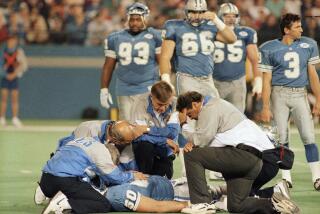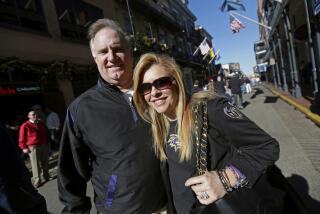COMMENTARY : Sensitivity Has Cost N.Y. Jets’ McNeil His 1st-String Job
- Share via
When he was a rookie in 1981, it was a sprained foot. In ‘83, a separated shoulder. In ‘84, broken ribs. In ‘86, a dislocated elbow. In ‘87, a severely pulled hamstring.
When three-time Pro Bowl starter Freeman McNeil doesn’t have a great season, it’s usually because of injuries--his own.
But can he now be having his worst season partly because of injury he caused to another?
Sounds absurd, doesn’t it? Many people will tell you that the sheer folly of trying to run behind the New York Jets offensive line is reason enough for any running back to have a bad season.
But in McNeil’s case, it seems there’s more to it than that. McNeil “suffers” from a malady rarely admitted to in the macho world of the NFL: sensitivity.
But McNeil’s sin was not his sensitivity. His sin was in letting it disturb his concentration. Letting it get in the way of his job.
It happened early in the second quarter against the Indianapolis Colts Oct. 1. The Jets ran a sweep to the right, Roger Vick the ball carrier. In a clean, above-board play, McNeil knocked down Colts linebacker Alston O’Brien with a roll block.
When the play was over, so was O’Brien’s season. He had torn knee ligaments and terrible pain. He would require surgery. Because of McNeil’s block, his career was in jeopardy.
When he realized what he’d done, McNeil, helpless and heartbroken, lingered over O’Brien’s fallen form. It was the first time McNeil had been directly responsible for another player’s injury. Distraught, he took himself out of the game and kneeled on the sideline, his head in his hand. He did not play the rest of the half.
McNeil played the second half, but he was, he admitted, in a fog. He made several mistakes, including lining up in the wrong spot and missing a block on a key play inside the Colts’ 10. And when the Jets ran a play like the one in which Alston was injured, McNeil, faced with another Colts linebacker, hit him high rather than low.
After the game, McNeil sought out Alston to see how he was. A Colts publicist said there were tears in McNeil’s eyes.
Jets Coach Joe Walton publicly criticized McNeil after the game for letting the team down, for being mentally out to lunch in a game the Jets lost, 17-10. The next day, McNeil went to Walton’s office and apologized. He apologized for losing his concentration. He did not apologize for his emotions.
“I’m not going to make any of my emotions wrong,” McNeil said later. “I should have been able to bounce back, to collect my thoughts and go out there and play. The initial contact (with Alston) was devastating. I had lost focus on what I was supposed to do.”
Three weeks later against the Bills, McNeil still hadn’t found his focus. He dropped two passes and made a fumble that led to a Bills touchdown. He also botched a handoff from quarterback Mark Malone that caused another fumble. He missed several blocks.
The next week against the 49ers, Walton moved Johnny Hector into the starting lineup. McNeil played only sparingly in the Jets’ loss to the 49ers, and in their last-second win over the Patriots Nov. 4.
Officially, McNeil touched the ball only once in the first half against the Patriots. But when he did, he ran 19 yards for a touchdown. It was the first TD the Jets offense had scored in 14 quarters. You’d figure a guy who runs 19 yards for a TD the first time he touches the ball should be given it more often.
But while Hector carried 21 times for 72 yards, a 3.4 average, McNeil--the only active back to average more than four yards a carry in eight consecutive NFL seasons--carried only twice more. When the game was on the line, he was on the bench.
McNeil, genuinely proud of being a team player, refuses to gripe. It’s part of life, he said, just a brief “down” he’ll use to increase his resilience and determination.
“I don’t like to say that I’m this or I’m that,” McNeil said, “but I’m a man built on emotion. There has to be a certain emotion, a passionate feeling, for me to enjoy something.”
McNeil’s sensitivity to the plight of others has always made him an All-Pro off the field. He is active in the United Way, Big Brothers, MS, Students Against Drunk Drivers, and a Long Island-based anti-hunger crusade founded by the late folk singer, Harry Chapin.
“There’s not a charity thing he turns down,” said Jets publicist Ron Cohen. “He’d rather go to one of those things than a paid speaking engagement. Because then he’s not obligated to anything but his values.”
When Hurricane Gloria hit in September, 1985, McNeil drove around Long Island in his pickup truck, helping stranded motorists. During the off-season and on virtually every Tuesday during the season--the players’ day off--McNeil visits schools and speaks to kids about drug abuse.
“There are some things that are so important that you don’t even think about yourself,” McNeil said.
But when you lose your starting job, there is more time to think. Isn’t it a bit depressing to realize that the very traits that make Freeman McNeil such a good person are hindering his career? Just as doctors must harden themselves to death so they can have the emotional energy to help the living, so must an athlete avoid getting so caught up in another’s misfortune to the degree that it affects his own performance.
In the Jets media guide, Walton called McNeil “an excellent team leader. . . . We have learned to expect only the best from him.”
It would be nice if we could again see Freeman McNeil at his best on the field. But it’s not as important as the good he does off it. Or as enduring.
More to Read
Go beyond the scoreboard
Get the latest on L.A.'s teams in the daily Sports Report newsletter.
You may occasionally receive promotional content from the Los Angeles Times.










